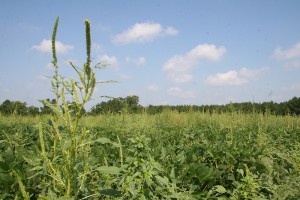Non-chemical Control of Weeds Successful
 Photo Credit: Delaware Agriculture
Photo Credit: Delaware Agriculture
A new study published in Weed Technology shows that non-chemical controls of weeds can be more effective than herbicides. The study focuses on the weed Palmer amaranth, which has become a major threat to soybean growth in the southern United States. In this study, 250,000 glyphosate-resistant Palmer amaranth seeds were incorporated into the soil, and their emergence was evaluated five times during the growing season. Three farming practices were tested, including deep tillage, planting a cover crop of rye, and double-cropping a field with wheat and then soybeans in the same growing season. Deep tillage and double-cropping soybeans with wheat offered 97 percent and 82 percent reductions in the first and second years. Researchers noted that as a result of these findings, deep tillage and double-cropping wheat and soybeans may offer the best weed control value. Because Palmer amaranth is one of many crops shown recently to develop resistance to herbicides, these practices are highly promising, and could lessen conventional dependence on pesticides for weed control.


